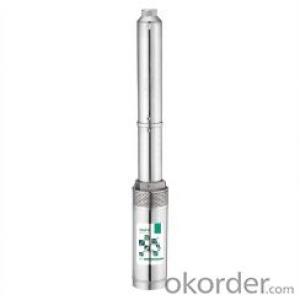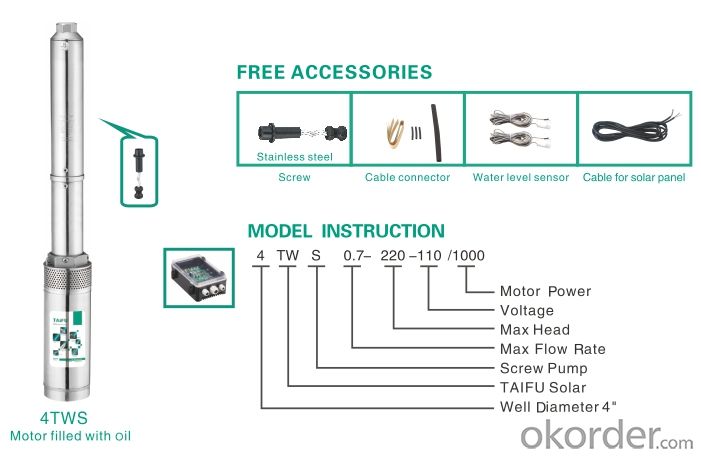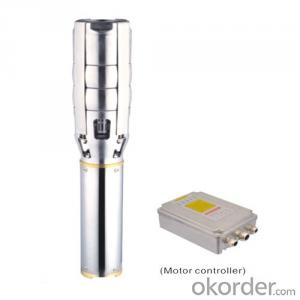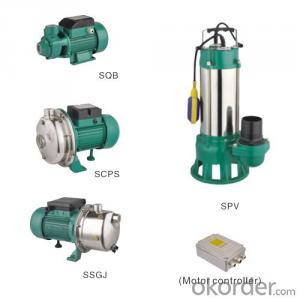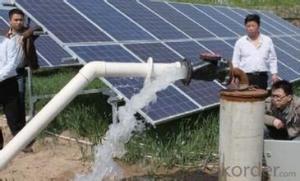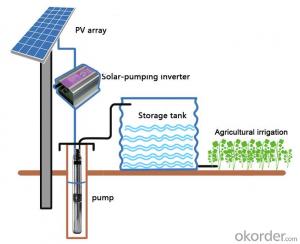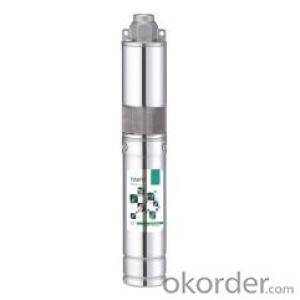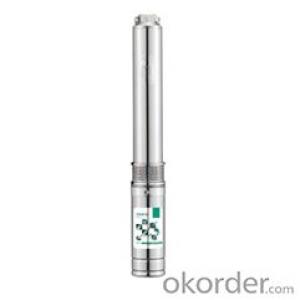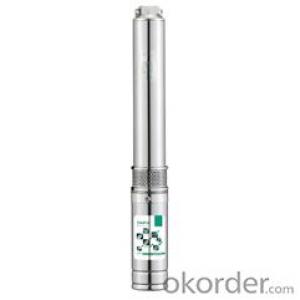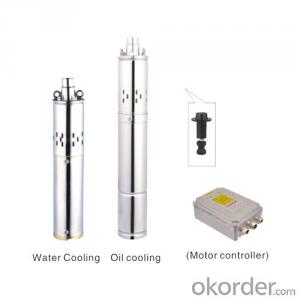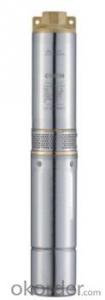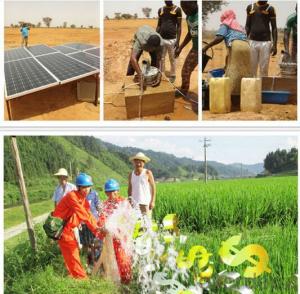Cheap Solar Pump 4TWS Solar Pump Stainless Steel CE, Solar Panel
- Loading Port:
- Shanghai
- Payment Terms:
- TT OR LC
- Min Order Qty:
- 50 pc
- Supply Capability:
- 100000 pc/month
OKorder Service Pledge
OKorder Financial Service
You Might Also Like
1.APPLICATION AREA:This project products are mainly used in dry region for irrigation of agriculture, It can be used for drinking water and
living water. The living condition could be much improved. It also can be used for fountains.2.MATERIAL OF PARTS:Outlet: stainless steel
Pump body: stainless steel
Motor body: stainless steel
Bearing: C&U
3.ADVANCED TECHNOLOGY:1.Application innovation
Compared with the traditional alternating current machine, the efficiency is improved 25% by the permanent magnetism, direct current, brushless, non-sensor motor.
2.Technics innovation
Adopt double plastic package for rotor and stator, motor insulation≥300MΩ, the motor security was much improved.
3.Structure innovation
Oil filling, convenient installation and environmental protection4.HIGHLIGHTSa.Energy-saving and environment-protected green products
b.High technique products adopting MPPT and DSP chip technique.
c.100% copper wire, cold-rolled silicon steel sheet
d.CE certificate
e.Advanced three phase brushless DC motor
f.Stainless steel 316 screws
g.3 years warranty5.PRINCIPLE OF OPERATION:Solar panel collects sunlight→DC electricity energy → solar controller(rectification,stabilization,amplification,filtering)→available DC electricity→(charge the batteries)→pumping water6.ADVANTAGES OF SOLAR PUMP SYSTEM:A.It is easier and more widely used than any other dynamoelectric driven pumps.
B.It is more economical and more environmentally friendly.7.MODEL SELECTION:a.The power of solar panel = power of pump ×1.3
The voltage of solar panel = the voltage of pump
The controller should be matched
b.Select the batteries according to the following formulas:
The use hour of battery =
The battery capacity ÷(the machine power÷the battery voltage)×0.6 For example,the machine power is 200W, the battery
capacity is 100AH,the voltage is 12V,and the battery is fully charged,then the use hour is:100÷(200÷12)×0.6=3.6hours
c.The battery capacity=
the use hour ÷0.6×(the machine power÷the battery voltage) For example,the machine power is 200W,the battery voltage
is 12V,and the battery need to be used for 3.6hours,then the battery capacity is:3.6÷0.6×(200÷12)=100AH

- Q: Can a solar pump be used for water supply in national parks or wildlife reserves?
- Yes, a solar pump can definitely be used for water supply in national parks or wildlife reserves. Solar pumps are an excellent and sustainable alternative to traditional pumps that require electricity or fuel. They harness the power of the sun to pump water from sources such as rivers, lakes, or wells and supply it to various locations within the parks or reserves. One of the main advantages of using solar pumps in these areas is their environmental friendliness. National parks and wildlife reserves are dedicated to preserving and protecting the natural ecosystem, so using solar pumps aligns perfectly with their goals. Solar pumps produce clean energy, reducing greenhouse gas emissions and minimizing the ecological impact on the surrounding environment. Furthermore, solar pumps are highly reliable and require minimal maintenance. They operate silently and efficiently, ensuring a consistent water supply for various purposes within the parks or reserves. This can include providing water for drinking, irrigation of plants, or even for wildlife habitats and watering holes. In remote areas, where access to electricity may be limited or non-existent, solar pumps are particularly beneficial. They can be installed in off-grid locations, eliminating the need for extensive electrical infrastructure and reducing costs associated with traditional pumps. Additionally, solar pumps can be easily integrated with other renewable energy sources, such as solar panels or wind turbines, to create a sustainable and self-sufficient water supply system. Overall, solar pumps are a viable and practical option for water supply in national parks or wildlife reserves. They offer numerous benefits, including environmental sustainability, reliability, and cost-effectiveness. By harnessing the power of the sun, these pumps can contribute to the conservation efforts of these protected areas while ensuring a reliable water supply for both humans and wildlife.
- Q: Can a solar pump be used for residential swimming pool heating?
- Yes, a solar pump can be used for residential swimming pool heating. Solar pumps utilize solar energy to circulate and heat the water in a swimming pool, making them an eco-friendly and cost-effective option for pool heating. By harnessing the power of the sun, solar pumps can efficiently warm the pool water, providing a comfortable swimming experience while reducing energy consumption and lowering utility costs.
- Q: Can a solar pump be used for water supply in industrial applications?
- Yes, a solar pump can be used for water supply in industrial applications. Solar pumps are capable of providing a reliable and sustainable water supply by utilizing solar energy to power the pump. They can handle large volumes of water and are suitable for various industrial processes such as irrigation, livestock watering, and water supply for manufacturing plants. Additionally, solar pumps offer cost savings and environmental benefits compared to traditional fuel-powered pumps, making them a viable option for industrial water supply.
- Q: Can solar pumps be used for dewatering purposes?
- Yes, solar pumps can be used for dewatering purposes. These pumps use solar energy to power their operation, making them a sustainable and cost-effective solution for removing water from various sources such as flooded areas, construction sites, and agricultural fields. Solar pumps are efficient, reliable, and require minimal maintenance, making them an ideal choice for dewatering applications.
- Q: How does the elevation affect the performance of a solar pump?
- The performance of a solar pump is significantly influenced by elevation. As the elevation increases, the solar pump's performance decreases due to various factors. To begin with, higher elevations result in a decrease in air density. This decrease in air density causes the solar panels to receive less sunlight per unit area, thereby reducing their efficiency. Consequently, the amount of electricity generated by the solar panels decreases, which has an impact on the overall performance of the pump. Additionally, higher elevations often entail longer distances for pumping. Since the pump must work against gravity to lift water to higher altitudes, it requires more energy to overcome the increased head pressure. This increased energy requirement leads to a decline in the pump's efficiency and performance. Furthermore, the pressure head at higher elevations is lower due to the decrease in atmospheric pressure. This decrease in pressure head affects the pump's ability to push water, resulting in decreased flow rates and pumping capacity. Lastly, higher elevations are generally associated with lower ambient temperatures. While lower temperatures can enhance the efficiency of solar panels, they can also negatively impact the pump's performance. The risk of water freezing at higher elevations can damage the pump's components or hinder its operation. In summary, elevation has a significant impact on the performance of a solar pump. It reduces the efficiency of solar panels, increases the energy required to overcome head pressure, decreases pressure head, and may lead to freezing issues. Therefore, when designing and selecting a solar pump, it is essential to consider the elevation to ensure optimal performance and efficiency.
- Q: Can a solar pump be used for water supply in horticulture farms?
- Yes, a solar pump can be used for water supply in horticulture farms. Solar pumps are an environmentally friendly and cost-effective solution for providing water for irrigation in agricultural settings. They utilize solar energy to power the pump, eliminating the need for electricity or fuel. This makes them a sustainable option for water supply in horticulture farms, enabling efficient irrigation and helping to optimize plant growth and crop yield.
- Q: How does a solar pump handle water with high levels of salt?
- A solar pump can handle water with high levels of salt by utilizing a reverse osmosis system. This process involves pushing the saline water through a semi-permeable membrane, which selectively allows water molecules to pass through while filtering out the salt and other impurities. As a result, the solar pump effectively removes the salt content from the water, making it suitable for various applications such as irrigation or drinking purposes.
- Q: How does a solar pump help in reducing water contamination?
- A solar pump helps in reducing water contamination by providing a reliable and sustainable source of clean water. Unlike traditional pumps that require fossil fuels or electricity, solar pumps use the energy from the sun to power the pump and extract water from wells, rivers, or other sources. By eliminating the need for fuel combustion or grid-based electricity, solar pumps reduce air pollution and greenhouse gas emissions. Additionally, solar pumps often come with built-in filtration systems that remove impurities and contaminants, ensuring that the water being pumped is safe and clean for consumption. This helps in reducing water contamination and improving overall water quality for communities.
- Q: Can a solar pump be used for water supply in refugee camps or disaster relief areas?
- Yes, a solar pump can indeed be used for water supply in refugee camps or disaster relief areas. Solar pumps are an excellent solution for these scenarios as they rely on sunlight to generate power and do not require a constant supply of electricity. This makes them ideal for remote locations or areas with limited access to traditional power sources. Solar pumps can be used to extract water from wells, boreholes, or other water sources and can be configured to provide a reliable and sustainable supply of water. They are typically equipped with photovoltaic panels that convert sunlight into electricity, which powers the pump and allows it to draw water from underground sources. The use of solar pumps in refugee camps or disaster relief areas offers numerous advantages. Firstly, they are environmentally friendly, as they do not produce any greenhouse gas emissions or contribute to air pollution. Additionally, solar pumps require minimal maintenance and have a long lifespan, reducing operating costs and the need for constant repairs. Furthermore, solar pumps are often designed with built-in water purification systems, ensuring that the water extracted is clean and safe for consumption. This is particularly crucial in disaster-stricken areas or refugee camps where access to clean water is essential for basic hygiene and the prevention of waterborne diseases. In conclusion, solar pumps are an excellent choice for water supply in refugee camps or disaster relief areas due to their reliance on sunlight, ease of use, low maintenance requirements, and ability to provide clean and sustainable water. They offer a practical and cost-effective solution to addressing water scarcity in these challenging environments.
- Q: Can a solar pump be used in areas with high levels of algae or bacteria in the water?
- Yes, a solar pump can be used in areas with high levels of algae or bacteria in the water. Solar pumps are primarily designed to move water from a source to another location using solar energy, and they do not directly interact with the water's quality. However, it is important to note that the water being pumped may still contain algae or bacteria, and appropriate water treatment methods or filters should be used to ensure safe consumption or usage.
Send your message to us
Cheap Solar Pump 4TWS Solar Pump Stainless Steel CE, Solar Panel
- Loading Port:
- Shanghai
- Payment Terms:
- TT OR LC
- Min Order Qty:
- 50 pc
- Supply Capability:
- 100000 pc/month
OKorder Service Pledge
OKorder Financial Service
Similar products
Hot products
Hot Searches
Related keywords
